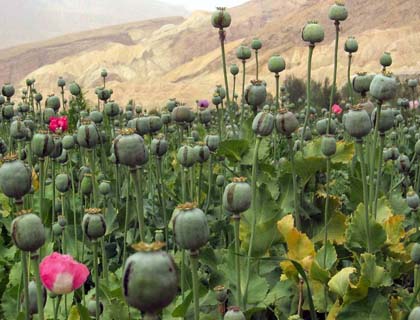Days ago, the Ministry of counter narcotics has announced that during 2012, Afghan drug addicts have spent 300 Million dollar. Haroon Rashid Sherzad, deputy to the Ministry, told in a press conference in Kabul that 72 percent of opium is produced in three restive eastern provinces---Helmand, Qandahar, Farah and Nimroz. It is estimated there are 1, 6 drug addicts in the country, constituting more than five percent of the total population which is one of the highest in the world.
The report draws a clear picture that security and opium cultivation go hand to hand. The restive provinces are the center of opium production of the world. Despite the deployment of Afghan foreign security forces, the Helmand province still has remained as hotbed of insurgents. Taliban except the center of the province exert influence in all its districts. So far the endeavor of foreign donors and Afghan government to convince people stop cultivating opium has not worked at all. The only alternative provided to cultivation of opium is saffron which indeed has produced good results in some provinces like Herat has not replaced the opium.
No doubt, addiction has become a real challenge to the entire social structure and troubling for political establishment. Addiction has mostly targeted lower layer of the society, who are involved in cultivating and growing opium. Or those who became refugees to neighboring countries and could bear the back-breaking problem of refugee life. So, I order to avoid those challenges, they found no way other than reprimanding nerves in order not to feel the psychological pain. After addiction, there is no money to provide them drugs; however, it is cheap in the country.
Therefore, they start becoming parasite. The very social door is closed towards them, because they are not married. In a country like Afghanistan, finding a house or room for single is very difficult. Here being a single is a crime. If you walk to streets of Kabul or contact brokers, the first question is: are you married or not? If not, then sorry, we do not have room for rent. Here marriage is a door of accepting people.
Additionally, poverty prevails in the country, and annually people die due to hunger. Majority of those who use drugs are illiterate. They cannot search for office job, which has comparatively convenient sphere for such people. Thus, they remain parasite. When all doors are closed, what they can do? Stealing! They change into pickpocket. It means threatening the safety of people’s property.
From security and political prospective, drug trafficking and opium cultivation is the main source of finance for insurgents. Militants encourage people to cultivate opium and benefit from its trafficking. If people stop cultivation, militants may not have resources for their operations and other activities.
Moreover, they are also reports that Afghan security forces too use drugs. This phenomenon gives birth to another vicious cycle. They will cooperate with opium-lords and gangsters. The process may end up into poor governance, inefficiency of administration and spiraling growth of corruption---and ultimately the progression of instability and deterioration of security situation.
Unfortunately, the measures held to tackle it has not worked well. Annually, we witness increase in number of drug addicts and domestic consumption. The latest report of Ministry of counter narcotics show the horrible level of domestic drug use.
Seemingly, the entire philosophy of counter narcotics is based on poverty. In another word, till now Afghan government and foreign involved countries justified the opium cultivation on the basis of severe poverty. It means if farmers of Helmand and Kandahar had enough to survive, they would not have cultivated opium. Based on this reasoning, millions of dollars pumped which however did not reach down to those deserved families in these provinces but still no change has made in the graph of opium cultivation and drug production.
I am against this philosophy. I am certain that opium cultivation is due to poverty but it cannot be eliminated through pumping money or introducing an alternative. Because there is no an end to desire of human beings. Who does want have a better life? Who does not want to earn more and more? It is the very human desire, does not belong to a particular person. Those who have thousands want to have million and those who have millions want to have billions. Everyone move toward money. Anyone or anything which gives them larger revenue, they will go towards that. Pumping money is not a solution at all. People will not be enticed to stop cultivating rather will be encouraged to do in order to gain larger.
Comparatively, the situation of farmers in Helmand and Qandahar is far better than farmers in central provinces where people die due to hunger. But meanwhile none of them are tempted to cultivate opium perhaps due to fear or moral obligation.
So, it is only possible religious scholars and government can put an end to the problem. The first one is government---through extending its influence across the country can force people to avoid opium cultivation. Religious scholars also should tell people that it is Haram because it harms Afghans who are Muslims. I think through means, it is possible to challenge the drug production and pouring money will complicate the situation.

